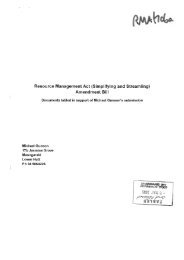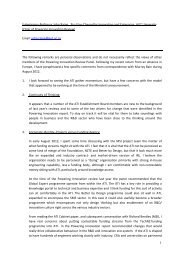Parliamentary Debates (Hansard) - New Zealand Parliament
Parliamentary Debates (Hansard) - New Zealand Parliament
Parliamentary Debates (Hansard) - New Zealand Parliament
Create successful ePaper yourself
Turn your PDF publications into a flip-book with our unique Google optimized e-Paper software.
16 May 2009 Local Government (Auckland Reorganisation) Bill 3637<br />
will find there is much more substance in these amendments than there was in Part 2,<br />
and therefore the debate should be proportionately longer.<br />
The CHAIRPERSON (Hon Rick Barker): The member could make that argument,<br />
but I have read quite a lot of the proposed amendments and I think some of them have<br />
not added to the fountain of wisdom in this place. I also mention to the member that<br />
substance is quite often more than just the number of words counted on the word<br />
processor.<br />
Hon DARREN HUGHES (Senior Whip—Labour): I raise a point of order, Mr<br />
Chairperson. I reassure you that this is a fresh point of order and has nothing to do with<br />
the timing of debates. This point of order is about a comment you made that I require<br />
some explanation on. It is the point you made that the proposed new parts we are<br />
dealing with should be seen just as amendments. When amendments to parts were<br />
debated previously they were stand-alone, single, one-clause amendments. The<br />
difference with this proposed new part—if we take, for instance, the part we considered<br />
for a little over 30 minutes in total, Mr Hawkins’ proposed new Part 11, “Auckland<br />
Transition Agency Review Commission”—is that it contains 25 new clauses. Yesterday<br />
we were voting on amendments to clauses. I think to consider an entire new part as<br />
being just the same as an amendment leads to some confusion in the Committee.<br />
Clearly, proposed new Part 11—with 25 clauses—will be much more substantial than<br />
an amendment to omit a certain date and substitute another. Much more work goes into<br />
developing these proposed new parts. They cover a much larger ambit of issues, and I<br />
think to just dismiss them as being the same as amendments that the Committee has<br />
seen previously is neither fair nor correct, because these proposed new parts contain a<br />
substantial number of clauses. I just ask your advice on that matter, because I think it<br />
could lead to some confusion as the Committee considers proposed new parts this<br />
morning.<br />
Hon SIMON POWER (Deputy Leader of the House): The attempt to define the<br />
nature of the debate by what it is labelled and how many words are involved, rather than<br />
by the content of what is involved in the debate itself, is leading to confusion. I submit<br />
that it seems to me that an attempt to define these types of debates puts you in a very<br />
difficult position, Mr Chair. As I understand it, the position under the Standing Orders is<br />
simply that your discretion—and your discretion alone—determines when the closure<br />
motion is taken. That should be the end of the matter.<br />
Hon DARREN HUGHES (Senior Whip—Labour): My friend the Deputy Leader<br />
of the House misinterprets what I mean. I am not discussing closure motions. We have<br />
dealt with that issue, the Chair has ruled on it, and we accept what you said. We are<br />
talking about the difference between proposed new parts and amendments.<br />
The Committee of the whole House used to consider a bill clause by clause. Indeed,<br />
if the Government forgot to move a part by part motion, then we would be subjected to<br />
hours and hours in Committee as it worked through clauses. It was always a challenge<br />
for Government whips to make sure a Minister moved a part by part motion. We have<br />
moved away from that situation to an assumption that the Committee of the whole<br />
House will always consider bills part by part, and that amendments relate to clauses—as<br />
we have seen so far. It is completely different when amendments are put down that<br />
create new parts, as we see here. An amendment to create a new part is a separate,<br />
debatable question, as opposed to individual amendments on clauses, which are not<br />
debatable questions; they are questions taken at the end of a debate alongside the<br />
Minister’s amendments and other members’ amendments. It is a completely separate<br />
area. Your comments that these proposed new parts are just like amendments is the<br />
point the Opposition is raising with you.






![Full evidence text [PDF 8908k] - New Zealand Parliament](https://img.yumpu.com/14025494/1/184x260/full-evidence-text-pdf-8908k-new-zealand-parliament.jpg?quality=85)
![−3 JUN 2009 IRELEASED] - New Zealand Parliament](https://img.yumpu.com/12829724/1/185x260/3-jun-2009-ireleased-new-zealand-parliament.jpg?quality=85)
![Full paper text [PDF 3515k] - New Zealand Parliament](https://img.yumpu.com/11267192/1/184x260/full-paper-text-pdf-3515k-new-zealand-parliament.jpg?quality=85)


![Full evidence text [PDF 9k] - Parliament](https://img.yumpu.com/7938085/1/184x260/full-evidence-text-pdf-9k-parliament.jpg?quality=85)





